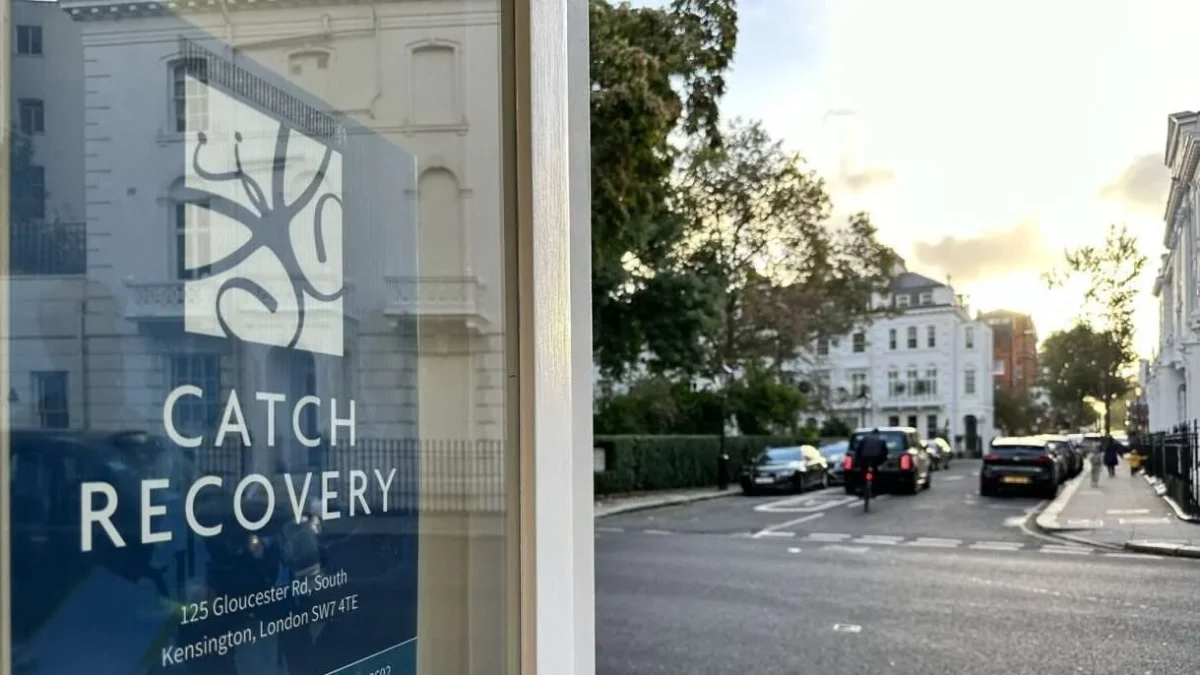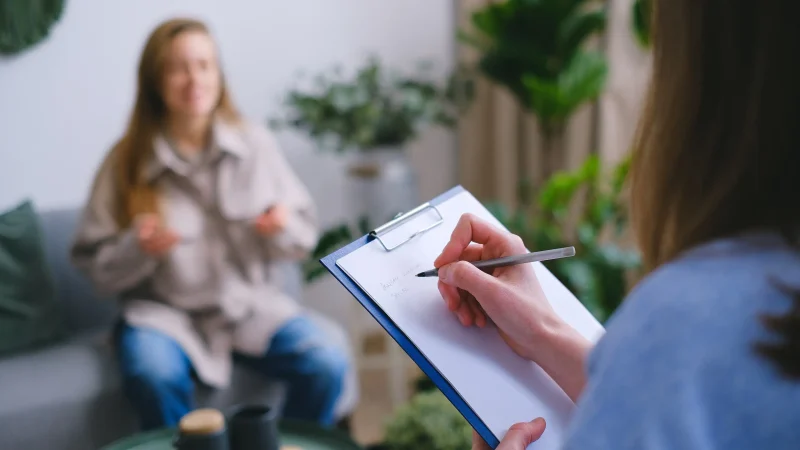
Start Your Addiction Recovery in London Today.
Are you tired of feeling trapped by your codeine or co-codamol use? It’s ironic how something meant to bring relief can end up controlling your life. But there is hope. Addiction counselling for codeine addiction can help you break free from its grip and regain control of your life. At CATCH Recovery, our compassionate and knowledgeable counsellors provide personalised support and evidence-based treatment to address the root causes of your addiction. Take the first step towards a healthier, happier future by seeking help today.
Benefits of Looking for Help
- Addiction counselling for codeine addiction can help you develop healthy coping mechanisms and build resilience.
- Online therapy is available for you when you are on-the-go or have other concerns regarding coming to us in-person.
- In-person therapy for codeine addiction support offers convenient and accessible counselling.
- Our personalised outpatient programme, including emotional support, accountability, and connection with peers are crucial elements of addiction counselling for codeine addiction.

Download Brochure
Signs That You Are Addicted to Codeine
If you’re struggling with a dependence on codeine, it’s essential to be aware of the signs that indicate you may be addicted to this medication. Codeine addiction is a serious condition that can have detrimental effects on your physical and mental well-being. Some common signs of codeine addiction include an intense craving for the drug, needing higher doses to achieve the same effect, experiencing withdrawal symptoms when trying to quit, and neglecting important responsibilities to obtain or use codeine. It’s crucial to seek help immediately if you believe you are addicted to codeine.
With online therapy for codeine addiction, we can make your path towards sobriety easier and more comfortable.
Remember, reaching out for help is the first step towards a healthier and happier life.
What Is Codeine?
When you struggle with dependence on codeine, codeine affects your body in ways beyond the pure effects you feel at first.

Codeine is an opioid medication commonly prescribed for pain relief and cough suppression. It works by binding to specific receptors in the brain, blocking pain signals and producing feelings of relaxation and euphoria. However, over time, your body can develop a tolerance to codeine, meaning you need higher doses to achieve the same effects. This tolerance can quickly become an addiction, where you feel compelled to use codeine despite adverse consequences.
Codeine addiction can have a profound impact on your life, as well as those around you. It can strain relationships with family and friends, cause financial difficulties, lead to health problems, and even contribute to community issues such as crime or drug misuse. At CATCH Recovery, we understand the challenges of overcoming codeine addiction and are here to support you on your recovery journey.
How Does Codeine Affect You
Codeine addiction can profoundly impact your family, causing emotional strain and disruption within your household. Couples affected by codeine addiction often face additional challenges in their relationship, as trust may be broken and communication becomes strained.
A study published in the Journal of Psychopathology confirms that abusing codeine and addiction can affect your body much differently than if you are using it according to your doctor’s advice. Issues observed in those dependent showed that the drug is related to developing depression, anxiety and gastrointestinal problems.
Furthermore, the health complications and trauma that result from codeine addiction can be overwhelming for both you and your loved ones. Remember, seeking help is not only beneficial for yourself but also for those who care about you.
Codeine Addiction’s Effect on Your Family
Understanding the impact of codeine addiction on your family is crucial in recognising the need for support and seeking appropriate treatment. Codeine addiction not only affects you, but it also takes a toll on those closest to you.
Your family members may experience stress, worry, and feelings of helplessness as they witness your struggle with addiction. They may feel torn between wanting to help you and being overwhelmed by the challenges of supporting someone battling addiction. This can lead to strained relationships, communication breakdowns, and financial difficulties.
Your loved ones care about you deeply and want to see you recover.
By seeking professional help for your codeine addiction, you will be taking the first step towards healing yourself and providing relief and hope for your family’s well-being. At CATCH Recovery, we understand this difficult journey and are here to provide compassionate support every step of the way. Reach out to us today – we can make things easier for you and your family.

Reclaim your life from codeine addiction.
Couples Affected by Codeine Addiction
If you and your partner are struggling with codeine dependence, it can significantly strain your relationship and overall well-being. Codeine addiction affects not only the person using the drug but also their loved ones, especially their partner. The impact of addiction on couples is far-reaching, as it can lead to communication breakdowns, trust issues, financial hardships, and emotional turmoil. Your relationship may become centred around obtaining and using codeine, causing important aspects like intimacy and shared activities to suffer.
If you’re in this situation, it’s essential to seek help for both yourself and your partner. Addiction counselling can provide the following:
A safe space for open dialogue.
Understanding the root causes of addiction.
Learning effective coping strategies.
Rebuilding trust within your relationship.
By addressing codeine addiction together as a couple, you increase your chances of successful recovery while strengthening your bond.
We understand couples’ challenges when dealing with codeine addiction. Our compassionate team is here to support both of you on this challenging journey towards healing and recovery.
Health Complications and Trauma Due to Codeine Addiction
If you or a loved one is struggling with dependency on codeine, it’s crucial to understand its potential consequences on your physical and mental well-being. Prolonged use of codeine can lead to various health complications, such as respiratory problems, liver damage, gastrointestinal issues, and hormonal imbalances. Moreover, the toll of addiction extends beyond physical health – it also takes a significant emotional and psychological toll.
The trauma caused by codeine addiction affects you personally, your family, and our community. It strains relationships, causes financial burdens, and erodes trust within families and communities. However, there is hope for recovery from this challenging journey towards healing. At CATCH Recovery, we support you in overcoming your codeine addiction while providing compassionate care every step of the way.

Codeine Addiction Counselling
If you’re struggling with codeine addiction, knowing that effective therapies are available to help you on your recovery journey is important. Codeine addiction counselling can provide you with the support and guidance needed to overcome this dependency. By participating in long-term care and support, you can experience the benefits of ongoing treatment, which includes a safe and compassionate environment where you can address the underlying issues contributing to your addiction, learn coping skills, and build a strong foundation for lasting recovery.
Therapies Used in Codeine Addiction Treatment
When seeking treatment for codeine addiction, you may benefit from various therapy options to support your recovery journey. Addiction counselling is a crucial component of codeine addiction treatment, as it helps you understand the underlying factors contributing to your addiction and develop strategies for coping with cravings and triggers.
Cognitive-behavioural therapy (CBT) can assist in identifying negative thought patterns and replacing them with healthier ones.
Motivational interviewing encourages self-reflection and fosters motivation for change.
Group therapy provides a supportive environment where you can connect with others who are going through similar struggles.
Family therapy involves your loved ones in healing, helping repair relationships damaged by addiction.
At CATCH Recovery, we offer these therapies and more to ensure that you receive comprehensive care tailored to your unique needs. Our compassionate team understands your challenges and is here to guide you towards lasting recovery.
Benefits of Long-term Care and Support
Now that we have explored the various therapies used in codeine addiction treatment let’s discuss the benefits of long-term care and support. When it comes to overcoming addiction, it is important to understand that recovery is a journey, and it takes time. Long-term care provides ongoing guidance and assistance as you navigate the challenges of codeine addiction. It offers a safe space to share your struggles, receive advice from experienced professionals, and connect with others on a similar path.
Long-term care helps you develop healthy coping mechanisms, build resilience, and address any underlying issues contributing to your addiction. It also ensures that you have continuous support during every stage of your recovery journey. At CATCH Recovery, we believe in providing compassionate and personalised care tailored to your unique needs. We understand that taking the first step towards recovery may be difficult, but trust us when we say that our dedicated team can make things much easier for you.
CATCH Recovery – Bespoke Addiction Counselling
If you are seeking support for your codeine addiction, CATCH Recovery offers two options: online therapy and in-person therapy. Our online therapy provides a convenient and accessible way to receive professional addiction counselling from the comfort of your home. Alternatively, our in-person therapy allows you to engage in face-to-face sessions with our compassionate counsellors, who understand the struggles associated with codeine addiction. Whether you choose online or in-person therapy, we are here to provide personalised and effective addiction counselling tailored to meet your specific needs.

Online Therapy for Codeine Addiction
CATCH Recovery understands the challenges you face and is committed to providing you with the personalised care you need.
Through virtual sessions with our experienced therapists, you will have the opportunity to explore the underlying causes of your codeine addiction, develop coping strategies, and set achievable goals for your recovery journey. We believe in treating holistically, addressing not only the physical aspects of addiction but also the emotional and psychological factors that contribute to it.

In-person Therapy for Codeine Addiction
provide in-person support tailored to your unique needs. We understand that codeine addiction can be overwhelming, but we are here to help you every step of the way.
Our in-person sessions include group and individual therapies, as well as some workshops.
At CATCH Recovery, we believe in the power of in-person therapy to guide you towards lasting recovery from codeine addiction.